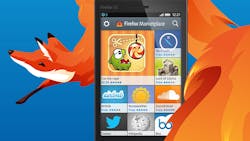Mozilla’s Firefox OS (Fig. 1) is going global at Mobile World Congress (MWC). Firefox OS targets smartphones and tablets. It has been in beta for quite awhile allowing developers to target the HTML5-centric platform (see “Understanding HTML5”). It will compete with Google’s Chrome OS that is also designed as an HTML5 platform. Both are based on their respective web browsers. They are not the only lightweight user interface platforms but they do highlight the move to browser-based interfaces and Javascript applications using the emerging HTML5 standard.
The front facing browser interface makes it easier to customize. In theory, the HTML5 support will allow applications to work on any of these systems. The current version of the Firefox OS is based on Firefox 18.
Browser-based operating systems provide a tighter link to the underlying system including file storage. The cloud is also in the mix as well with remote storage being an alternative and a reason platforms go lighter on the local storage. In theory, this helps reduce the amount of support needed on the hardware platform. In practice, the platforms will likely push the envelope.
Who Wants A New Operating System?
The list of wireless vendors supporting Firefox OS includes América Móvil, China Unicom, Deutsche Telekom, Etisalat, Hutchison Three Group, KDDI, KT, MegaFon, Qtel, SingTel, Smart, Sprint, Telecom Italia Group, Telefónica, Telenor, TMN and VimpelCom. This means that it will be showing up in countries like Brazil, Colombia, Hungary, Mexico, Montenegro, Poland, Serbia, Spain and Venezuela. Mozilla is working with smartphone vendors including Alcatel, LG and ZTE.
Some of the big players like Samsung are not too interested in Firefox OS because they already have solutions like Android. Of course, their platforms can always run the Firefox browser or other HTML5 platforms.
The framework that Firefox OS provides is similar to Chrome OS with a marketplace and billing system. Both are based on Linux. Firefox OS is based on Mozilla’s Boot to Gecko (B2G) project. Google’s Android is also based on Linux but its apps are written in Java and target the Dalvik virtual machine (see “Google’s Android Versus Apple’s iOS: And The Winner Is?”). Android also supports native apps but these are not as portable as the Java-based applications. Javascript and HTML5 can be used on Android via a web browser app like Firefox or Chrome.
The ability to run HTML5 Javascript applications on almost any platform is what makes Firefox OS and Chrome OS interesting. Javascript is actually a powerful language but it is in a different league than C and C++. Still, it is more than suitable for user applications. It can handle streaming video with HTML5 support. The types of devices that can be supported is more limited by the hardware than the software. This could include almost anything found on a smartphone today including GPS, cameras and movement sensors.
Multiple tasks can be active. Its multitasking support is not for real time applications but it is better than some of the task switchers that tend to be found on smart phones. Debugging can be done on a number of platforms including a PC running a B2G desktop application. It is even possible to use the GDB debugger with Firefox OS.
Firefox OS will have to take on the big two: Apple’s iOS and Google’s Android. Windows Phone and Chrome OS are also in the mix so it will be a matter of the kind of traction that Firefox OS gets. It may be the number 3 platform since pushing out either of the big two is highly unlikely. Also, they target the premium space so there may be an opening for low to midrange solutions.
Firefox OS’s open source may prove to be an advantage in the long run. Of course, there will be a question of whether the OS diverges. Apple has kept strict control over iOS and Google is attempting rein in the Android variants.
Firefox OS and other HTML5 platforms may garner support from application developers because it has the potential for being a write once, run everywhere solution. The big question will be how well advanced peripheral support works across hardware platforms.
Either way, Firefox OS is one to keep an eye on.
About the Author
William Wong Blog
Senior Content Director
Bill's latest articles are listed on this author page, William G. Wong.
Bill Wong covers Digital, Embedded, Systems and Software topics at Electronic Design. He writes a number of columns, including Lab Bench and alt.embedded, plus Bill's Workbench hands-on column. Bill is a Georgia Tech alumni with a B.S in Electrical Engineering and a master's degree in computer science for Rutgers, The State University of New Jersey.
He has written a dozen books and was the first Director of PC Labs at PC Magazine. He has worked in the computer and publication industry for almost 40 years and has been with Electronic Design since 2000. He helps run the Mercer Science and Engineering Fair in Mercer County, NJ.
- Check out more articles by Bill Wong on Electronic Design
- Bill Wong on Facebook
- @AltEmbedded on Twitter

